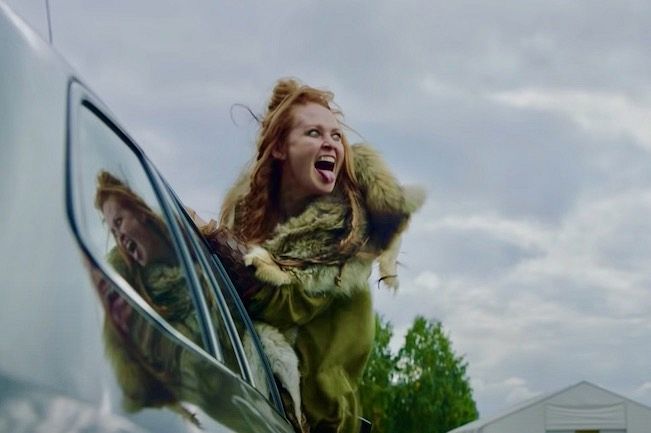'Beforeigners' is a wild time-travelling Scandinavian series with plenty to say on migration, technology and the universal need to connect, writes Dr Lisa Harper Campbell.
YET ANOTHER hidden gem is waiting for you in the online catalogue from SBS on Demand. This time, it’s the first Norwegian series from HBO Nordic (now HBO Max), a fascinating blend of genres spanning buddy-cop comedy, crime thriller, haunting science-fiction and psychological drama.
Beforeigners first introduces us to a 21st-Century Oslo we may expect; clean streets, high-rise buildings, city lights and busy but orderly foot traffic.
A young cop is buying an apartment with his wife for their growing family, aware of the significant investment he is making by buying in the heart of the city. As he signs the contract, the real estate agent reassures him that buying in this location is never a bad idea. That may have been true but when visitors emerge from the neighbouring Bjørvika bay that night, those visitors stay and forever change Oslo’s cultural landscape.
A tensely chilling opening sequence lays the groundwork for this imagined and very messy world in which we find our protagonists. The first group of time-travellers, a group of bewildered Vikings, arrive in the water by Oslo’s opera house.
Our young cop, Lars Haaland (Nicolai Cleve Broch), is the first responder on the scene. As he tries to understand the situation, television reports from around the world start flooding in. People are migrating from the past all over the world. How and why will remain questions to resolve but the more pressing question of "what now?" is the one on which series creators Anne Bjørnstad and Eilif Skodvin ruminate.
Instead of lingering in the immediate aftermath of the first arrivals and getting bogged down in expositional scientific explanations, the first episode immediately transports us into the future, much like its titular characters.
What greets audiences during the opening credits is a diverse modern-day Oslo where disparate cultural (and chronological) groups have learned to co-exist over many years.
Haaland’s bayside apartment block is now filled to the brim with "time-migrants". His upstairs neighbour is a stone-ager, his parking lot has become a Viking marketplace and his wife has left him for a 19th-Century gentleman who acts as a warm yet verbose and strict stepfather to Lars’ now teenage daughter.
The main focus of series one is the budding friendship between Haaland and Oslo police’s first Viking-era recruit, Alfhildr Enginsdottir (Krista Kosonen).
As they investigate the death of a woman from the Stone Age, complex conspiracies emerge including the Neo-Luddite movement rejecting modern technology, the trafficking of unsuspecting time-migrants and the existence of a multi-temporal federal agency monitoring the mysterious time-travel to (and perhaps from) the present.
Season two is much darker as Alfhildr and Lars investigate a serial killer resembling Jack the Ripper.
Secondary characters provide moments of profound sadness. An investigator of Jewish descent following the trail of Jack the Ripper has travelled to the present from 19th-Century England. A throwaway line of dialogue reveals that he suffered a mental breakdown when he discovered that all of his descendants had been killed in the Holocaust. Skipping ahead doesn’t mean skipping the pain.
Despite the moments of existential confusion, dread and loss, there is plenty of humour woven throughout the story too.
Kosonen and Cleve Broch are the anchors of the show, the former acting as a particular strong compass even when the story starts to lean into the absurd. It’s a series which earns its leaps and bounds across the space-time continuum and from one strange (but still wonderful) plot point to the next.
The humour also allows for biting satire. When Saint Olaf (former King of Norway) is unable to prove his identity, a senior public servant equates Olaf’s warrior status with his own — proving that, today, the bureaucratic pen is indeed mightier than the Viking sword. “So, I guess we’re both badasses.”
Exchanges such as these allow the series to pass comment on contemporary (and very real) issues of racism, prejudice, forced assimilation and exclusion surrounding immigration and migration.
The assumption could be that people arriving from the past would be so enamoured by today’s technology and therefore accept and adapt to this change. Not so. In Beforeigners, these groups cling to their former rituals, languages and identities.
To their credit, the modern Norwegian institutions in this created world are indeed doing their best to acknowledge and welcome this diversity, offering opportunities without curtailing freedoms.
A mountain of dedicated research lies behind this series’ production. Linguists were employed to teach Stone-Age, Old Norse and 19th-Century versions of Norwegian to cast members and the production design details are brilliant.
A bid has been made for a third series to be commissioned but the ground looks a little shaky after HBO Max removed all of its Scandinavian content following its merger with WarnerMedia in July of this year. Get in quick while the two series are available on SBS on Demand.
Dr Lisa Harper Campbell is a writer, researcher and educator from Adelaide, South Australia. You can follow Lisa on Twitter @lisahcampbell88.
 This work is licensed under a Creative Commons Attribution-NonCommercial-NoDerivs 3.0 Australia License
This work is licensed under a Creative Commons Attribution-NonCommercial-NoDerivs 3.0 Australia License
Support independent journalism Subscribe to IA.











